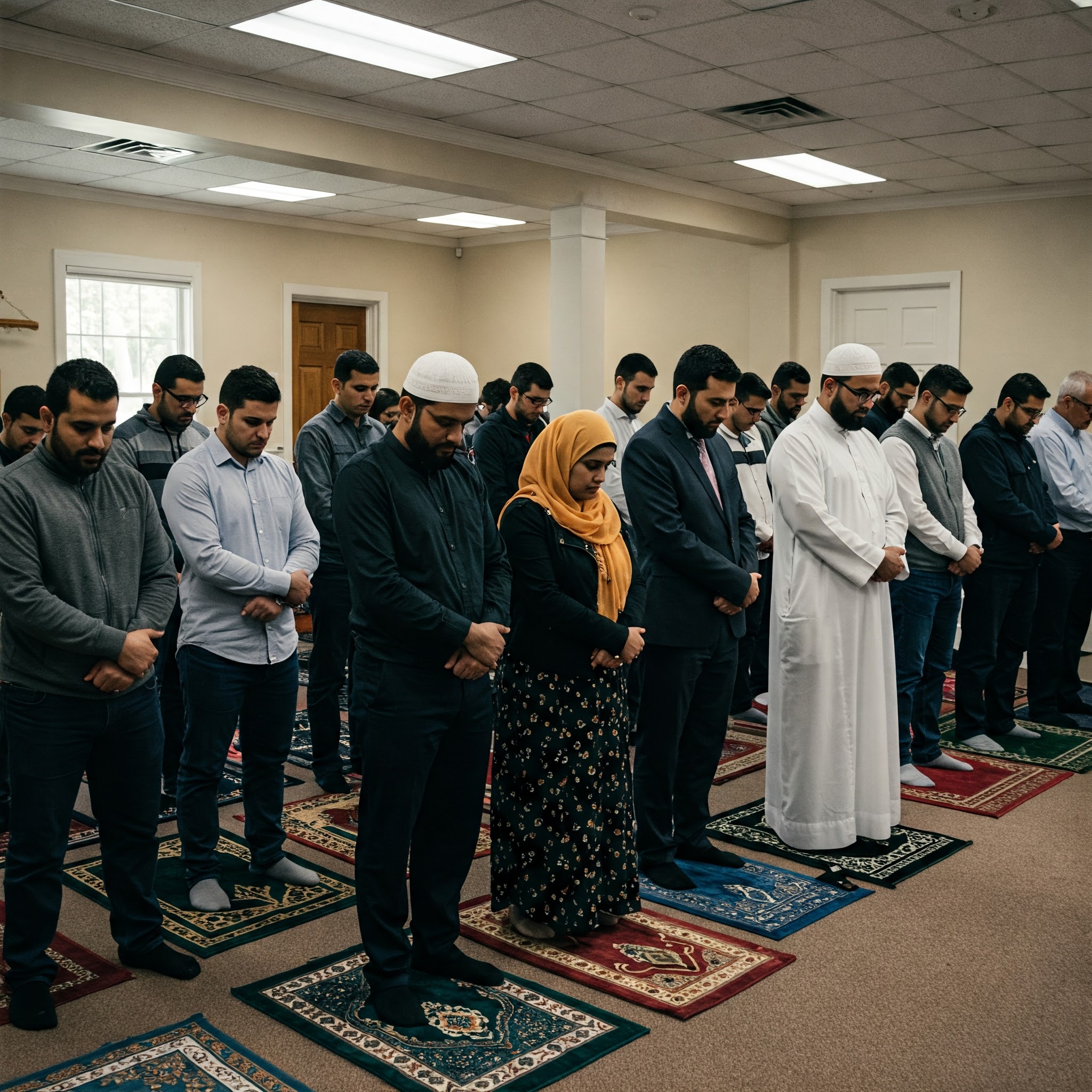Understanding Muslim Funeral Rites in the US and Estate Closure

Navigating Janazah: Understanding Muslim Funeral Rites in the US and Estate Closure
Losing a loved one is universally challenging, and navigating the immediate aftermath, especially estate closure, adds complexity. For Muslim families in the US, understanding Islamic funeral rites, known as Janazah, is crucial during this sensitive time. This guide provides a straightforward overview of Muslim funeral practices in the US context and how platforms like Stairway can offer practical support during estate closing.
Key Aspects of Muslim Funerals in the US
Muslim funerals, or Janazah, are characterized by specific religious obligations and cultural practices that prioritize swiftness, simplicity, and community involvement. Understanding these key aspects is essential for both Muslim families and those supporting them.
Core Principles:
- Speed and Timeliness: Islamic tradition emphasizes burying the deceased as quickly as possible, ideally within 24 hours of death. This urgency can impact estate closing timelines.
- Simplicity and Modesty: Elaborate caskets and extravagant displays are discouraged. The focus is on simple shrouding (Kafan) and burial.
- Community Involvement: Janazah is a communal obligation (Fard Kifayah). The Muslim community plays a vital role in preparing the body, performing funeral prayers, and supporting the bereaved family.
- Specific Rituals: The process involves specific rituals like washing (Ghusl) the body, shrouding, funeral prayers (Salat al-Janazah), and burial facing the Qibla (direction of Mecca).
US Context Considerations:
- Legal and Logistical Framework: Navigating US legal requirements for death certificates, permits, and cemetery regulations while adhering to Islamic timelines can be challenging.
- Availability of Services: Access to Muslim funeral homes, cemeteries with dedicated Muslim sections, and trained personnel for Ghusl varies across the US.
- Cultural Integration: Muslim communities in the US have adapted Janazah practices to the local context while preserving core religious principles.
Key Statistics and Context
While precise statistics on Muslim funerals in the US are not readily available, understanding the demographics provides context:
- Growing Muslim Population: The Muslim population in the US is estimated to be around 3.45 million in 2017 1 and is projected to grow. This indicates an increasing need for understanding and accommodating Muslim funeral practices.
- Diverse Communities: US Muslims are a diverse group with varied ethnic and cultural backgrounds. While core Islamic principles of Janazah remain consistent, cultural expressions may differ.
- Geographic Distribution: Muslim communities are concentrated in major metropolitan areas across the US, influencing the availability of specialized funeral services.
Example: In Dearborn, Michigan, with a significant Arab American Muslim population, there are established Muslim funeral homes and cemeteries that cater specifically to Janazah rites. In contrast, in a smaller town with a smaller Muslim community, families might need to work harder to find appropriate services and resources.
Step-by-Step Guide to Muslim Funeral Rites (Janazah) in the US

Understanding the steps involved in Janazah helps families prepare and navigate the process effectively.
-
Immediate Actions After Death:
- Confirmation of Death and Legal Procedures: Obtain a legal death certificate. In the US, this usually involves a medical professional or authorities.
- Contacting the Muslim Community: Inform the local mosque or Islamic center. Community members are crucial for assisting with funeral arrangements.
- Washing (Ghusl) the Body: This ritual purification is performed by adult Muslims of the same gender as the deceased. Many mosques or Islamic centers have facilities and trained individuals for Ghusl. In the US, some funeral homes also offer this service according to Islamic guidelines.
Example: "When my father passed away in Chicago," recalls Aisha Khan, a community member, "the local mosque Imam immediately helped us. Volunteers came to our home to perform Ghusl, following the proper Islamic procedures. It was a huge relief to have their support during such a difficult time."
-
Shrouding (Kafan):
- The body is shrouded in simple, white, seamless cloths (Kafan). Men are typically shrouded in three pieces, and women in five.
- This is usually done after Ghusl and before the funeral prayer.
-
Funeral Prayer (Salat al-Janazah):
- This is a special prayer performed for the deceased. It is typically held in a mosque or prayer area, or even at the cemetery before burial.
- Salat al-Janazah is performed standing, without bowing or prostration. It consists of supplications and prayers for the deceased and the Muslim community.
Example: "The Janazah prayer for my grandmother was held at the Islamic Center of Southern California," says Omar Hassan. "It was comforting to see so many people from the community come together to pray for her. It highlighted the importance of community in our faith."
-
Burial (Dafan):
- Swift Burial: As mentioned, prompt burial is emphasized. This often means navigating weekend or holiday restrictions in the US to bury within 24-48 hours if possible.
- Facing the Qibla: The deceased is buried facing the Qibla (direction of Mecca), lying on their right side.
- Simple Burial: Caskets are generally discouraged in traditional Islamic practice, though some US cemeteries may require them. If a casket is used, it should be simple.
- Muslim Cemetery or Section: Burial ideally takes place in a Muslim cemetery or a designated Muslim section within a larger cemetery. The availability of these varies geographically in the US.
Example: "Finding a Muslim cemetery plot in New York City was a challenge," explains Fatima Ali. "Space is limited, and we had to work with the Islamic community to secure a plot in a designated Muslim section of a larger cemetery in Long Island. It required quick action and coordination."
Estate Closure and Janazah: Unique Considerations

The urgency of Janazah rites can intersect with and sometimes complicate the estate closure process in the US.
- Immediate Decisions: Families need to make quick decisions regarding funeral arrangements while also beginning to think about legal and financial matters related to the estate.
- Access to Funds: Ideally, some funds should be readily accessible to cover immediate funeral expenses. However, estate assets may be frozen pending legal processes.
- Inheritance Matters: Islamic inheritance laws are detailed and may differ from US state laws. While inheritance distribution is typically addressed after the funeral, understanding the basic principles is important. Islamic inheritance laws prioritize specific heirs and fixed shares as outlined in the Quran and Sunnah 2.
Quote: "The emotional and logistical demands of arranging a Janazah while simultaneously facing estate matters can be overwhelming," notes Imam Yusuf Estes, a prominent American Muslim speaker. "Families need practical support to navigate both aspects with dignity and efficiency."
How Stairway Can Help During This Difficult Time
Stairway is an AI-powered platform designed to streamline estate closing. It can be particularly helpful for Muslim families navigating Janazah and estate matters concurrently by:
- Organizing and Centralizing Information: Stairway helps families gather and organize crucial documents (death certificate, will, financial records) in one secure platform. This is vital when time is of the essence.
- Task Management and Checklists: Stairway provides checklists and task management tools to ensure all necessary steps for estate closing are addressed in a timely manner. This can be adapted to incorporate Janazah-related tasks and deadlines.
- Communication Hub: The platform facilitates communication among family members, legal professionals, and funeral service providers, ensuring everyone is informed and coordinated, which is crucial for swift decision-making.
- Guidance and Resources: Stairway can provide access to relevant resources and information about estate closing processes in the US, potentially including links to Islamic legal resources or funeral service directories.
- Reducing Administrative Burden: By automating and simplifying many administrative tasks associated with estate closing, Stairway frees up families to focus on grieving and supporting each other during the Janazah period.
Example: Imagine a family using Stairway after the passing of a loved one. They can immediately upload the death certificate, create a task list that includes "Contact Muslim funeral home," "Arrange Ghusl," "Inform Imam," and "Start probate process." Stairway can then help track progress, send reminders, and keep all family members informed, reducing stress and potential miscommunication during a highly emotional time.
Conclusion
Understanding Muslim funeral rites (Janazah) in the US is essential for providing culturally sensitive and religiously appropriate support to Muslim families during bereavement. The emphasis on speed, simplicity, and community involvement shapes the entire process. Platforms like Stairway can offer invaluable practical assistance by streamlining the estate closing process, allowing families to focus on their faith, community, and grieving process during this significant life event. By combining cultural understanding with efficient tools, we can better support families during their time of need.
References
1 - Pew Research Center. (2017). America’s Changing Religious Landscape. https://www.pewresearch.org/religion/2017/02/15/americas-changing-religious-landscape/
2 - Esposito, John L. (2004). The Oxford Dictionary of Islam. Oxford University Press. (For general information on Islamic inheritance laws).
SEO Optimizations:
Meta Tags:
- Title Tag: Muslim Funerals in the US: Janazah & Estate Closure (58 characters)
- Meta Description: Understand Muslim funerals (Janazah) in the US and estate closure. Learn key rites, US context, and how Stairway can help families navigate this process. (159 characters)
Internal and External Linking:
-
Internal Links: (Placeholders - Replace with actual links on your website)
- [Link to Stairway AI homepage] (e.g., "Stairway is an AI-powered platform...")
- [Link to a blog post about estate closing checklists] (e.g., "Task Management and Checklists...")
- [Link to a page explaining Stairway's document organization features] (e.g., "Organizing and Centralizing Information...")
-
External Links:
- [Pew Research Center] (Linked in references)
- [Oxford University Press] (Linked in references)
- [Potentially link to ISNA (Islamic Society of North America) or CAIR (Council on American-Islamic Relations) for further resources on Muslim practices in the US.]
Image Optimization:
-
File Names:
- muslim-funeral-janazah-us.jpg
- islamic-burial-rites-america.png
- stairway-estate-closure-muslim-families.jpg
-
Alt Text Examples:
<img src="muslim-funeral-janazah-us.jpg" alt="Muslim funeral rites (Janazah) in the US"><img src="islamic-burial-rites-america.png" alt="Islamic burial rites being performed in America"><img src="stairway-estate-closure-muslim-families.jpg" alt="Stairway AI platform helping Muslim families with estate closure after a funeral">
Note: Remember to replace the bracketed placeholders with actual links and choose relevant, high-quality images for your blog post. Ensure the references are correctly linked and formatted in your final markdown file.